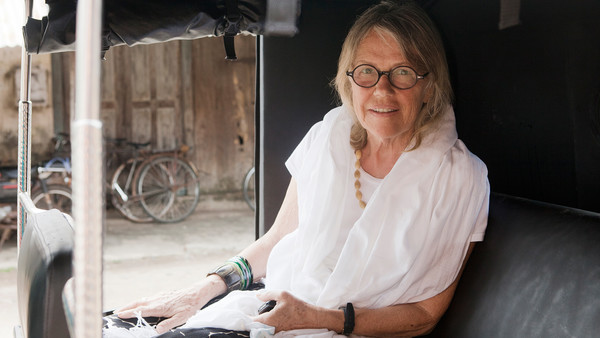
Serendipity is what brought Kathrin Messner to Sri Lanka — appropriately enough, given the word’s origin. Coined by Horace Walpole in 1754, it stems from Serendip, the Persian name for the island. She and her late husband Josef Ortner had been searching all over the world for a second home in a place where their daughter could go to school. “When we first came to Sri Lanka, more than three decades ago, it was only for a vacation,” she says. “Then we fell in love with this country.”Born and raised in Vienna, Messner, now 70, studied economics in Salzburg and languages in France but was always interested in art and the social sciences. She met her husband in the specialist art bookshop she set up after her studies, the first of its kind in Vienna. “He came to my bookshop,” Messner says, laughing, “and that was that”.
Together, they founded the “museum in progress”, another distinctive and successful venture in the Austrian capital. With corporate support, at least initially, this private art association commissioned renowned artists and curators to develop projects and artworks to be exhibited in spaces where one would not ordinarily see art: on billboards and building façades; in newspapers; on television and the internet. It was, in essence, a museum without walls.
Running it meant the couple were fully a part of Vienna’s artistic community. Yet they knew they did not want to spend all their lives in Vienna, and found its art scene increasingly stifling. “We had two options,” says Messner. “Either to save our money and travel the world whenever we could or try to find somewhere else to settle down, so as to really go deeper into another culture.”
When they started visiting Sri Lanka Messner remembers how slow everything seemed. Elephants and cows could be seen alongside vintage cars. The capital, Colombo, had one set of traffic lights. “It was like travelling back in time,” she says. “Everything was so chaotic and disorderly. We were fascinated. And we wanted to try and stay here.”
Their first visit to Sri Lanka, in 1983, coincided with the onset of the civil war, the end of which Messner’s husband never lived to see. He passed away, unexpectedly, a few weeks before the Tamil Tigers were defeated by the armed forces, in May 2009. Although, according to Messner, tensions remain, the country has become a safer place, attracting tourists and developers alike.
Throughout the civil war, certain parts of the island, mainly in the north and east, were off-bounds and Messner has only visited them recently. But in the south, where the couple bought a plot of land in a small fishing village, Wathuregama, 80km from Colombo, things were more peaceful. The couple took out loans to buy neighbouring plots and set up the one world foundation.
On one of the plots was a family house, which the couple turned into a school. Partly financed by a guesthouse, Bogenvillya, which the couple ran, and partly by income from the museum in progress in Vienna, the school sought to respond to local needs. Nurturing artists no longer made sense to Messner and Ortner in the Sri Lankan context; education became a priority for them.
Long in the planning, the one world foundation will celebrate its 20th anniversary this year. What started as a school for 100 pupils, taught by three teachers in as many classrooms, now offers free schooling and vocational training for more than 1,100 children as well as adults, and employs 37 teachers.
Buying the land to make it possible was a protracted process. It took years. Part of the difficulty lies in Sri Lanka’s undivided land policy. One plot of land can have more than a hundred owners, all of whom have to be bought out. “You pay them all and when you think the job is done, the next one comes along,” says Messner. “It’s difficult to find them all, but if they have deeds, they can tell you ‘Oh, this is my palm tree.’ You need a good lawyer,” she says.
Unlike many developers that have profited from booming tourism, Messner and her husband were committed to “fair tourism”, which the one world foundation embodies. The proceeds from the guesthouse, which offers lucrative Ayurvedic treatments and hosts artists and writers, fund projects at the school. Visitors effectively let themselves be pampered with the satisfaction of it being a “fair exchange” and “a lasting investment in the host country”.
It took a while to get this model to work. At first, the income from the guesthouse was not sufficient to keep the school running, especially as many of the regular guests were artist friends hardly in a position to support the project financially. “Two months before the tsunami came, we finally got it. The wheel was turning,” Messner says.
The tsunami, which hit the island on December 26 2004, destroyed practically everything and claimed many lives in the village. Messner still finds it difficult to talk about it. Faced with all the destruction, she and her husband had to resist the urge to walk away. With the support of the mayor of Vienna and artist friends who held an auction, they bought a former cinnamon plantation further inland and built a new school.
Messner feels her work is valued, particularly by the children and parents. But it can be hard going. Wathuregama is a remote fishing village and Messner is conscious that she must respect their way of life. Although she does not always understand their reactions, she enjoys working with Sri Lankan people and thinks Buddhism stands them in good stead. “The trouble is, they have so many holidays and take such delight in festivities,” she says with glee. “Sometimes I wonder how any work gets done.”